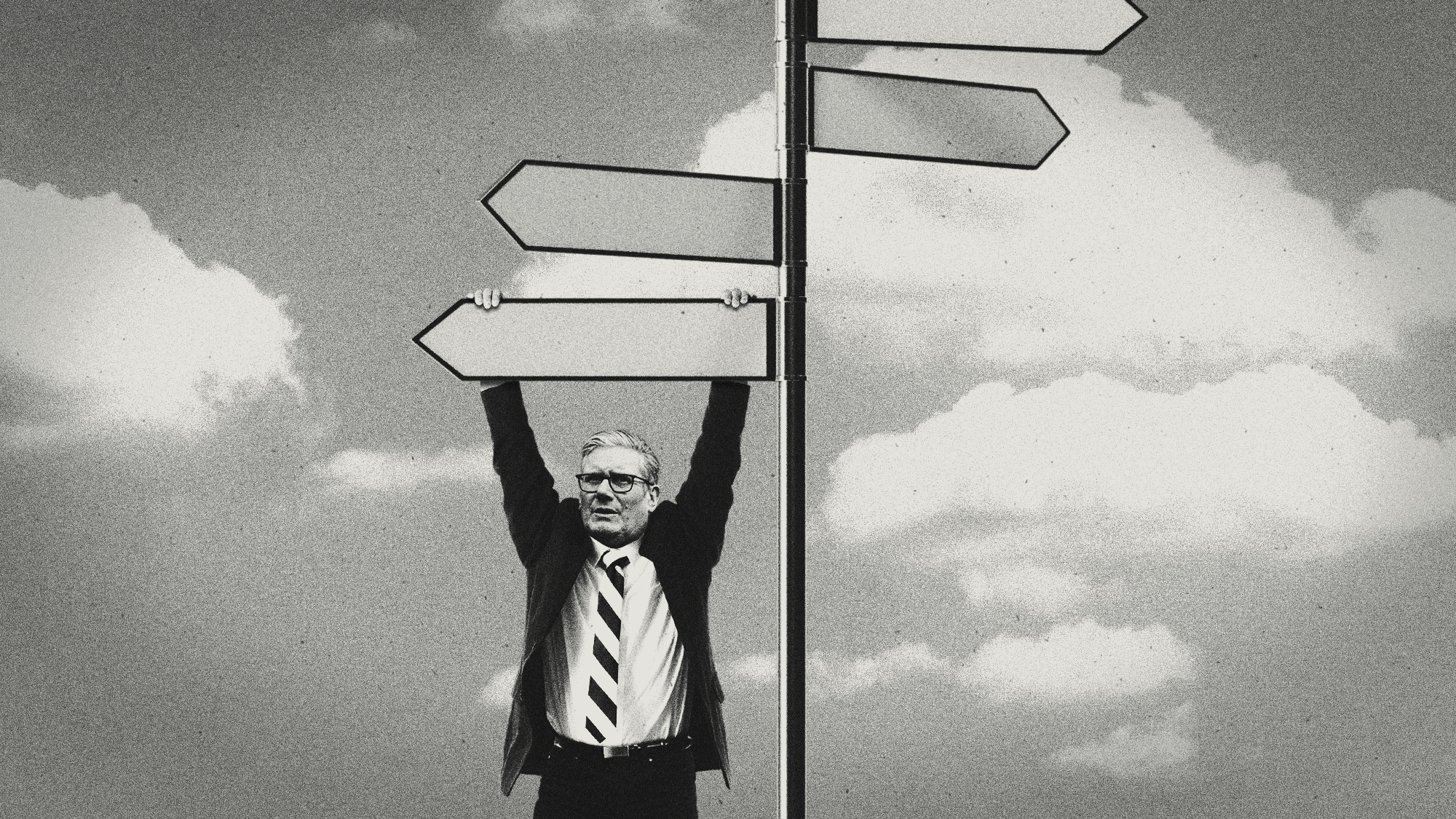Keir today, gone tomorrow: is welfare U-turn beginning of the end for Starmer?
Being 'forced to retreat' this early in his reign is 'simply unprecedented' and shows his government is now 'in trouble', say commentators

A free daily email with the biggest news stories of the day – and the best features from TheWeek.com
You are now subscribed
Your newsletter sign-up was successful
Keir Starmer's first year in office has turned out stormier than he might have hoped when he entered Number 10 on a landslide victory – and yesterday's climbdown on disability-benefit cuts brings an uncomfortable edge to his impending anniversary.
When he was campaigning ahead of the general election, Starmer promised "stability and competence", said The Economist, but it's "not quite worked out like that", and his government is now "in trouble".
What did the commentators say?
"It's worth taking a beat to reflect on the enormity of this moment," said Beth Rigby, political editor of Sky News, because, less than a year ago, the PM won by a landslide. Being "forced to retreat by angry foot soldiers" this early in his reign is "simply unprecedented".
The Week
Escape your echo chamber. Get the facts behind the news, plus analysis from multiple perspectives.

Sign up for The Week's Free Newsletters
From our morning news briefing to a weekly Good News Newsletter, get the best of The Week delivered directly to your inbox.
From our morning news briefing to a weekly Good News Newsletter, get the best of The Week delivered directly to your inbox.
The welfare-bill episode will force Starmer into a rethink. The "trajectory and nature of this government has been permanently changed" by this climbdown, said Stephen Bush in the Financial Times. It shows that, "when push comes to shove", the government can't "grit out and defend cuts in public spending".
"It's also a defeat for the 'MPs need to get in line' style" that Starmer's team thought they could "make their default approach to managing the Parliamentary Labour party. This is a "significant moment" for "how Starmer's administration handles the next four years".
The chance of more rebellions has just got higher, said Sam Blewett at Politico. "Labour MPs will be asking themselves whether they can be really sure any line Starmer sets will hold" after his authority has been "well and truly dented by a third major U-turn in quick succession".
There is a view among Labour MPs "that Starmer's Downing Street operation doesn't listen to them", said Henry Zeffman at the BBC, and their "frustration" is directed "with increasing intensity at Morgan McSweeney, the prime minister's chief of staff", whose future Starmer might feel forced to reconsider.
A free daily email with the biggest news stories of the day – and the best features from TheWeek.com
He may also have to reconsider Rachel Reeves' position because the chancellor has become "extraordinarily unpopular among Labour MPs", who blame her for "marching them up the hill, then down again, making them look stupid" on winter fuel payments and the welfare bill, said Andrew Marr in The New Statesman.
The latest U-turn leaves "Starmerism, the final line of defence between the far left and the levers of power, on the brink of collapse", said Sherelle Jacobs in The Telegraph. The concessions on welfare "may buy him a little more time" but Starmer's days in 10 Downing Street "are starting to look numbered".
What next?
When the House of Commons votes on the welfare bill next week, there should be enough MPs who "see the concessions as a victory" and "decide that they are better off taking the win than risking being part of a doomed last stand", said the FT's Bush.
But if the government were to lose that vote, it would threaten Starmer "directly", said Marr in The New Statesman, and, extraordinarily, after so many "self-indulgent Tory leadership battles", Labour might "throw itself into something similar". We "should be sceptical" of the prospect but "once a party has decided its leader simply cannot win, nothing matters more".
Chas Newkey-Burden has been part of The Week Digital team for more than a decade and a journalist for 25 years, starting out on the irreverent football weekly 90 Minutes, before moving to lifestyle magazines Loaded and Attitude. He was a columnist for The Big Issue and landed a world exclusive with David Beckham that became the weekly magazine’s bestselling issue. He now writes regularly for The Guardian, The Telegraph, The Independent, Metro, FourFourTwo and the i new site. He is also the author of a number of non-fiction books.
-
 ‘Poor time management isn’t just an inconvenience’
‘Poor time management isn’t just an inconvenience’Instant Opinion Opinion, comment and editorials of the day
-
 Bad Bunny’s Super Bowl: A win for unity
Bad Bunny’s Super Bowl: A win for unityFeature The global superstar's halftime show was a celebration for everyone to enjoy
-
 Book reviews: ‘Bonfire of the Murdochs’ and ‘The Typewriter and the Guillotine’
Book reviews: ‘Bonfire of the Murdochs’ and ‘The Typewriter and the Guillotine’Feature New insights into the Murdoch family’s turmoil and a renowned journalist’s time in pre-World War II Paris
-
 The Mandelson files: Labour Svengali’s parting gift to Starmer
The Mandelson files: Labour Svengali’s parting gift to StarmerThe Explainer Texts and emails about Mandelson’s appointment as US ambassador could fuel biggest political scandal ‘for a generation’
-
 Will Peter Mandelson and Andrew testify to US Congress?
Will Peter Mandelson and Andrew testify to US Congress?Today's Big Question Could political pressure overcome legal obstacles and force either man to give evidence over their relationship with Jeffrey Epstein?
-
 Reforming the House of Lords
Reforming the House of LordsThe Explainer Keir Starmer’s government regards reform of the House of Lords as ‘long overdue and essential’
-
 How long can Keir Starmer last as Labour leader?
How long can Keir Starmer last as Labour leader?Today's Big Question Pathway to a coup ‘still unclear’ even as potential challengers begin manoeuvring into position
-
 ‘Being a “hot” country does not make you a good country’
‘Being a “hot” country does not make you a good country’Instant Opinion Opinion, comment and editorials of the day
-
 What is at stake for Starmer in China?
What is at stake for Starmer in China?Today’s Big Question The British PM will have to ‘play it tough’ to achieve ‘substantive’ outcomes, while China looks to draw Britain away from US influence
-
 Can Starmer continue to walk the Trump tightrope?
Can Starmer continue to walk the Trump tightrope?Today's Big Question PM condemns US tariff threat but is less confrontational than some European allies
-
 Alaa Abd el-Fattah: should Egyptian dissident be stripped of UK citizenship?
Alaa Abd el-Fattah: should Egyptian dissident be stripped of UK citizenship?Today's Big Question Resurfaced social media posts appear to show the democracy activist calling for the killing of Zionists and police